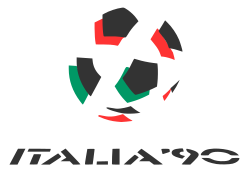
Back FIFA Sokker-Wêreldbekertoernooi in 1990 Afrikaans Fußball-Weltmeisterschaft 1990 ALS የ1990 እ.ኤ.አ. ፊፋ የዓለም ዋንጫ Amharic كأس العالم 1990 Arabic كاس العالم 1990 ARZ Copa Mundial de Fútbol de 1990 AST 1990 FİFA Dünya Kuboku Azerbaijani Piala Jagat FIFA 1990 BAN Чэмпіянат свету па футболе 1990 Byelorussian Чэмпіянат сьвету па футболе 1990 году BE-X-OLD
| Coppa del Mondo Italia '90 (Italian) | |
|---|---|
 | |
| Tournament details | |
| Host country | Italy |
| Dates | 8 June – 8 July |
| Teams | 24 (from 5 confederations) |
| Venue(s) | 12 (in 12 host cities) |
| Final positions | |
| Champions | |
| Runners-up | |
| Third place | |
| Fourth place | |
| Tournament statistics | |
| Matches played | 52 |
| Goals scored | 115 (2.21 per match) |
| Attendance | 2,516,215 (48,389 per match) |
| Top scorer(s) | |
| Best player(s) | |
| Best young player | |
| Fair play award | |
← 1986 1994 → | |
The 1990 FIFA World Cup was the 14th FIFA World Cup, a quadrennial football tournament for men's senior national teams. It was held from 8 June to 8 July 1990 in Italy, the second country to host the event for a second time (the first being Mexico in 1986). Teams representing 116 national football associations entered and qualification began in April 1988. 22 teams qualified from this process, along with the host nation Italy and defending champions Argentina.
The tournament was won by West Germany, for the third time. They beat defending champions Argentina 1–0 at the Stadio Olimpico in Rome, a rematch of the previous final four years earlier. Italy finished third and England fourth, after both lost their semi-finals in penalty shootouts. This was the last tournament to feature a team from West Germany, with the country being reunified with East Germany a few months later in October, as well as teams from the Eastern Bloc before the end of the Cold War in 1991, as the Soviet Union and Czechoslovakia teams made their final appearances. Costa Rica, Ireland and the United Arab Emirates made their first appearances in the finals. As of 2022, this was the last time the United Arab Emirates qualified for a FIFA World Cup finals. Cameroon went on an unexpectedly strong run in the tournament, becoming the first African team to reach the quarter-finals of the World Cup. The official match ball was the Adidas Etrusco Unico.
The 1990 World Cup is widely regarded as one of the poorest World Cups in terms of the games.[1][2][3][4] It generated an average 2.21 goals per game – a record low that still stands[5] – and a then-record 16 red cards, including the first dismissal in a final. The tournament also had a significant lasting influence on the game as a whole. In England, the team's success in this tournament led to the resurgence of the domestic top-flight, which had suffered from violence on the pitch and hooliganism by spectators throughout the 1980s.[6] It saw the introduction of the pre-match Fair Play Flag (then inscribed with "Fair Play Please") to encourage fair play. Overly defensive tactics of many teams led to the introduction of the back-pass rule in 1992 and three points for a win instead of two, both of which have encouraged attacking play, increasing spectator interest in the sport. The tournament also produced some of the World Cup's best remembered moments and stories, including the emergence of African nations, in addition to what has become the World Cup soundtrack: "Nessun dorma".[6]
The 1990 World Cup stands as one of the most watched events in television history, garnering an estimated 26.69 billion non-unique viewers over the course of the tournament.[7] This was the first World Cup to be officially recorded and transmitted in HDTV by the Italian broadcaster RAI in association with Japan's NHK.[8] The huge success of the broadcasting model has also had a lasting impact on the sport.[6] At the time it was the most watched World Cup in history in non-unique viewers, but was bettered by the 1994 and 2002 World Cups.[9]
- ^ "Italy 1990". BBC Sport. 17 April 2002. Archived from the original on 26 January 2011. Retrieved 11 August 2010.
- ^ "World Cup 1990". ESPN Soccernet. 9 November 2009. Archived from the original on 26 October 2012. Retrieved 11 August 2010.
- ^ Glanville, Brian (2005). The Story of the World Cup. Faber. ISBN 0-571-22944-1.
- ^ Freddi, Cris (2006). Complete Book of the World Cup. HarperSport. ISBN 978-0-00-722916-1.
- ^ "FIFA World Cup Record – Organisation". Archived from the original on 13 June 2007. Retrieved 14 June 2012.
- ^ a b c "A riot of colour, emotion and memories: the World Cup stands alone in the field of sport". The Independent. Archived from the original on 1 May 2022. Retrieved 20 August 2018.
- ^ "World Cup and Television" (PDF). FIFA. 2006. Archived from the original (PDF) on 14 June 2007. Retrieved 6 June 2007.
- ^ "L'Alta Definizione a Torino 1986 – 2006 di Marzio Barbero e Natasha Shpuza". Crit.rai.it. Archived from the original on 3 August 2021. Retrieved 23 May 2012.
- ^ "The FIFA World Cup TV viewing figures" (PDF). FIFA. Archived from the original (PDF) on 27 November 2007. Retrieved 31 October 2007.